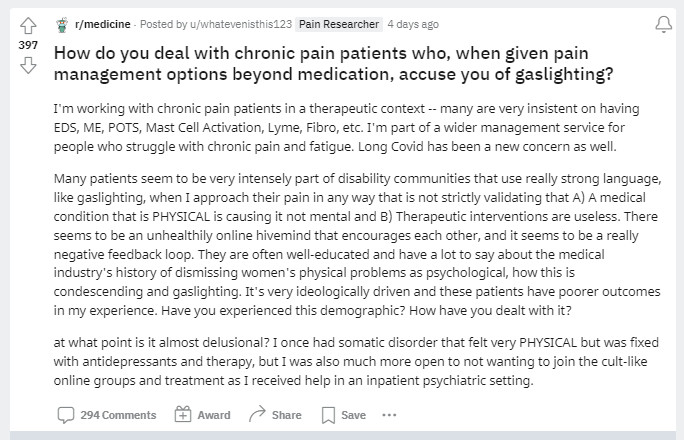Saying the Quiet Part Out Loud: What Doctors Really Think of Chronic Pain Patients
I have a moderate distrust of the health care system (and I bet, if this headline caught your eye, you do too). It comes from decades of being juggled between specialists like a hot bag of microwave popcorn, being put through brutal batteries of tests that ultimately route to dead ends, and fighting countless insurance claims through clenched teeth. But most of all, it comes from bad experiences: in exam rooms, in hospitals, in MRI machines.
And in these days of people having no filter on the internet, you can find message boards on just about any topic – niche fetishes, quirky hobbies, neighborhood gossip mills. But if you’re a “perennial patient” like me, I am here to warn you about a subreddit out there for medical professionals with a whopping 386,000 members. Here is its community description:
/r/medicine is a virtual lounge for physicians and other medical professionals from around the world to talk about the latest advances, controversies, ask questions of each other, have a laugh, or share a difficult moment.
Sounds tame enough, right? At a quick glance, a lot of the conversations are what you’d expect – asking questions about patient cases (with de-identified details), exchanging links to studies and recent research, trading war room stories about internships and fellowships. But here’s a conversation I wish I never clicked into: How do you deal with chronic pain patients who, when given pain management options beyond medication, accuse you of gaslighting?

It’s possible you might find the content of that particular thread triggering, so not to worry, I’ve done some sleuthing on your behalf and here are a few of my takeaways:
Doctors do not understand the value of patient communities.
It seems ironic (and hypocritical) to me that a conversation which bashes chronic illness “hiveminds” on TikTok and Instagram is being held in a toxic web community meant for medical professionals… and yet there’s overt dismissal of the value that chronic pain patients get from the exact same type of forum. Riddle me that one.
Doctors cannot fully comprehend a framework that wasn’t meant for them.
One professional wrote that they didn’t like Spoon Theory as an analogy for chronic illness because “no one is carrying around spoons. Or forks. Or knives.” But, gasp… did you ever think the theory wasn’t meant for you? Not everything is about you, doc. Promise.
The “normalization of mental health” is not the low blow they think it is.
A couple of comments griped about how “mental health” has become such a mainstream term as if it was blasphemy. *Blinks.* I’m really struggling to find the negative in that but OK. Moving on.
Generalizations in a medical context are dangerous.
I already wrote an op-ed directed at the New York Times for their grossly displayed opinions on opiates but wow, here we go again. Not all patients are drug-seekers. Please do not diagnose and treat us as such.
TLDR: Doctors, we see you.
Your patients are out here in the wild with access to the internet and we. see. you. – talking about us, gossiping about our intentions, and making haphazard accusations about our invisible battles.
Here’s what often goes on inside our heads while we perch on cold, sterile exam tables: Do you believe me? Will you take my pain seriously? Will you fight for answers as hard as I’m fighting to exist?
That is the quiet part of living with chronic pain. Those are our very real fears. And you know what happens when we stumble upon conversations like that subreddit? We lose faith. You take that tiny, quiet voice in our head and make it so hellishly loud. You make us doubt ourselves. You encourage us to stop seeking answers and just grin and bear it. You invalidate our symptoms and you underscore our fights. You make us want to give up before we even step foot inside a hospital. But most importantly, you encourage us to band together! You can’t have it both ways.
So, medical professionals, I ask of you (honestly, I am borderline begging at this point): Think before you type. Ask yourself, “Would I feel OK if the next patient who walked into my office read this?” Because let me tell you, I sure as hell wouldn’t feel comfortable if I saw someone on my care team chiming in on those conversations. Nope, not one bit.
Getty image by Westend61.

